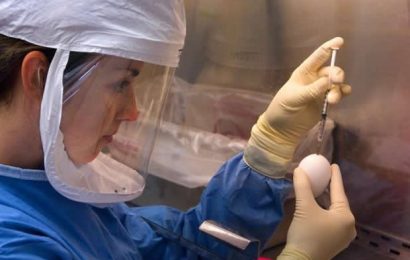

For some people who get COVID-19, the acute illness is just the opening act. Nagging symptoms—from fatigue and brain fog to GI symptoms and more—can arise or persist in the weeks or months after their bodies have shed the SARS-CoV-2 infection. But why? And what can be done to help them?
Recognizing the toll of "long COVID," scientists around the globe have been on a mission to tease out answers, hoping to pave the way for effective treatments. A group of researchers reporting in the journal Cell believe they have made some headway.
The study, published January 24, identifies a handful of factors that may help to predict which people are likely to go on to develop long COVID—or what researchers call PASC, post-acute sequelae of COVID-19. The analysis singles out four biologic factors tied to long COVID, specifically, the presence and level of autoantibodies (which are antibodies that attack the body's own healthy tissues), Epstein-Barr virus in the blood, viral load (meaning the amount of SARS-CoV-2 genetic material in the blood), and pre-existing type 2 diabetes.
Though the study doesn't prove that these factors cause chronic symptoms, and larger and longer-term analyses are still needed, the research is still a meaningful step forward for science—and people affected by the condition.
"It's early work, but it's important work," says Nahid Bhadelia, MD, founding director of Boston University's Center for Emerging Infectious Diseases Policy and Research and member of the Infectious Diseases Society of America.
Here's what experts are saying about the significance of the research for those who experience long-COVID symptoms.
What is long COVID?
First, let's define the problem. The US Centers for Disease Control and Prevention (CDC) refers to long COVID as "post-COVID conditions." You might also run across terms like post-acute COVID, chronic COVID, long-haul COVID, or PASC. They all refer to the same phenomenon: the new, ongoing, or recurring symptoms that people who've been infected with the SARS-CoV-2 virus (which causes COVID-19) may experience.
The symptoms are wide-ranging and poorly understood, says the CDC. The agency lists nearly two dozen commonly reported ones that linger on, including:
- Difficulty breathing
- Fatigue
- Malaise
- Brain fog
- Chest pain
- Headache
- Diarrhea
- Insomnia
- Rash
Typically, symptoms are present four or more weeks after the viral infection, according to the CDC, although it says that timetable is a rough estimate and subject to change as scientists learn more about COVID's long-term effects.
It's not known exactly how many people go on to develop long COVID; studies present wildly differing estimates. One review of studies published last October in JAMA Open Network finds nearly a third to upwards of two-thirds of COVID patients experience at least one post-COVID symptom, and that more than half of COVID survivors have symptoms that persist six months after their recovery from the virus. Those figures are based on an analysis of studies involving more than 250,000 COVID survivors.
Capturing the true burden of long COVID is complicated by the lack of access to COVID testing, particularly in communities of color, and by the lack of diversity in research studies, Dr. Bhadelia points out. The lack of a standard definition of long COVID across studies, which use different symptom scales and methodologies, is a problem, too, she says.
On top of that, how do you tease apart the effects of long COVID versus the impact of hospitalization after a serious bout of COVID? Or between long COVID and living in the times that we do?
"It's been two years in a global pandemic. We're all fatigued," says Dr. Bhadelia.
Factors that may predict long COVID
The new study in Cell brings together researchers from Seattle; San Francisco; Stanford, California; and elsewhere. Interestingly, the group didn't set out to investigate long COVID. It was only after these post-COVID symptoms began to emerge that the team pivoted.
"We did this longitudinal study because we wanted to understand how immunity against the virus developed," says James R. Heath, PhD, a coauthor of the study and president and professor at the Seattle-based Institute for Systems Biology, a nonprofit biomedical research organization. "Once we began to appreciate that long COVID was emerging, then we did some slight modifications to the study to understand it more completely," he tells Health.
Researchers studied two "cohorts," or groups of patients. The main cohort of 209 patients with COVID had blood draws and nasal swabs after their initial diagnosis, about a week later (around the peak of their acute disease), and two to three months later. A separate group of 100 patients had testing, too, which served to validate findings in the main cohort.
Using those patient samples, symptom surveys, and other data, the team conducted a "deep immunological analysis" aimed at solving the long-COVID puzzle. For example, a lot of patients were feeling fatigue or flu-like symptoms. So researchers looked into whether they had inflammatory proteins in their blood samples, which could signal ongoing inflammation.
All in all, the study revealed four potential predictors of long COVID. However, the presence of certain autoantibodies was "twofold more important" than any other factor identified in the study, says Heath.
Autoantibodies
Don't confuse autoantibodies with the antibodies your immune system makes to fight off illness. Autoantibodies are immune system proteins that mistakenly attack a person's own tissues. They're found in autoimmune diseases like lupus.
As autoantibodies rise, protective SARS-CoV-2 antibodies decrease, according to a news release describing the findings of the Cell study and the association of these proteins with long COVID.
The presence of detectable autoantibodies is the risk factor, but the level is important, too, says Heath. "Higher levels of autoantibodies do seem to correlate with more severe PASC," he explains.
Other studies have looked at the role of autoimmune antibodies in COVID. One study funded by the National Institutes of Health (NIH), for example, shows autoimmunity against certain parts of the immune response can worsen acute outcomes from SARS-CoV-2.
Does that mean anyone with an autoimmune condition could be at greater risk of developing long COVID? For people with one disease in particular, it certainly appears so: "This is almost certainly true for lupus—those patients have the same autoantibodies as the ones we measured," says Heath.
But Jason S. Knight, MD, PhD, associate professor in the Division of Rheumatology at the University of Michigan, suggests the implications are more nuanced. For people at a "preclinical" stage (meaning those who have autoantibodies in their blood but no symptoms or diagnosis), "I think the study suggests that they are at increased risk of getting long-COVID symptoms."
But for people already diagnosed with lupus? Those people may be on multiple treatments that could potentially neutralize a long-COVID syndrome from developing, Dr. Knight tells Health. "For all we know, those meds may give them protection," he reasons. He would like to see a study of patients with established autoimmune disease.
At this point, it doesn't make sense for people to rush to their doctor to get their blood tested for autoantibody levels. That would be neither practical nor helpful in terms of treating people with long COVID, stresses Kathleen Bell, MD, professor and chair of the Department of Physical Medicine and Rehabilitation at UT Southwestern Medical Center, which operates COVID Recover clinics for people experiencing post-COVID effects.
This is "a research-oriented finding" aimed at understanding the mechanisms that may predict long COVID, says Dr. Bell.
Epstein-Barr virus (EBV)
Epstein-Barr is one of the most common viruses in humans, says the CDC. Most people get infected during their lifetime, although not everyone develops symptoms or recognizes that they have EBV. It's also the most common cause of mononucleosis. Typically seen in teens and young adults, mono is known for causing extreme fatigue. After someone becomes infected with Epstein-Barr, the virus is known to lie dormant in the body.
Researchers looked for evidence of EBV DNA (the virus' genetic fingerprint) in blood samples and discovered a link: its presence in the blood shortly after becoming infected with SARS-CoV-2 predicted long COVID. "We saw some relations between Epstein-Barr virus levels at diagnosis and the types of symptoms that you might expect a patient might have with mononucleosis," Heath observes. "It doesn't mean that we can definitely connect those two, but they look connected."
It also doesn't mean that people who had COVID were being diagnosed with EBV. "We do see it in (the blood of) patients right at diagnosis, and it fades away very quickly afterwards. It's very transient," says Heath.
The presence of EBV is interesting, adds Dr. Bhadelia. "When a body gets stressed, you sometimes see reactivation," and that can lead to viremia—viruses in the blood. It's more common in immune-compromised patients, she says. "It'll be interesting to know if that's just an indication of the body being stressed—and, hence, you're reactivating persistent, lingering viruses that might be around."
Other factors
Two other factors may help predict long COVID, according to the study. One is the level of SARS-CoV-2 genetic material in the blood shortly after infection. Each person's "viral load" was determined by the presence of viral fragments of SARS-CoV-2 RNA in their blood.
Researchers also observed a significant association between long-COVID symptoms and type 2 diabetes. It's possible that the disease somehow alters the immune response to the virus, Heath speculates.
"My guess is that there are multiple pre-existing conditions that can anticipate PASC," he says, "but any one of those conditions may not be sufficiently represented in our study to show up with significant statistics."
So what’s the upshot for people with long COVID?
Ultimately, larger, longer-term studies are needed to suss out why some people experience long-COVID symptoms and what prevention and treatment strategies may be effective.
"This is still one of the biggest studies I've seen to date," adds Dr. Knight. The findings can help inform larger studies, he says.
To that end, the NIH is supporting a large study of long-term COVID, called the RECOVER Initiative (short for "REsearching COVID to Enhance Recovery). Researchers across the country are expected to participate, enrolling tens of thousands of people.
"With the NIH prospective study, I think there will be a lot of evidence that will start associating and linking outcomes to treatments," says Dr. Bell.
Adds Dr. Bhadelia, "I think it's the beginning of a long road in trying to figure out the answers."
The information in this story is accurate as of press time. However, as the situation surrounding COVID-19 continues to evolve, it's possible that some data have changed since publication. While Health is trying to keep our stories as up-to-date as possible, we also encourage readers to stay informed on news and recommendations for their own communities by using the CDC, WHO, and their local public health department as resources.
Source: Read Full Article


